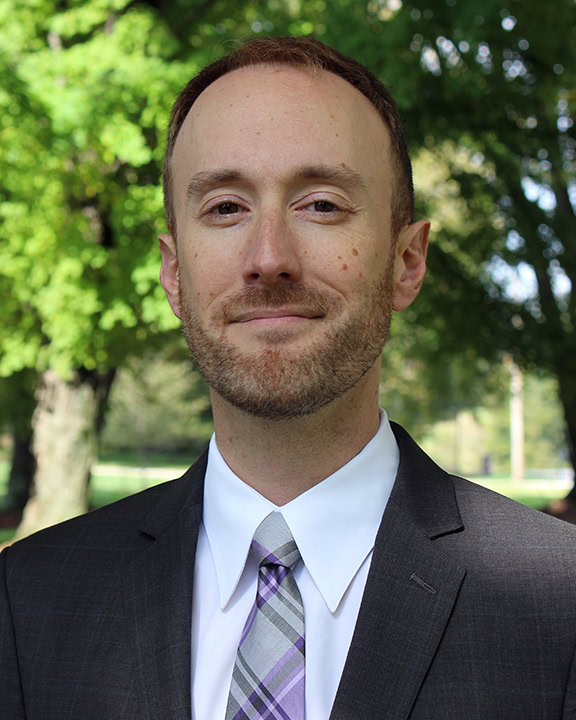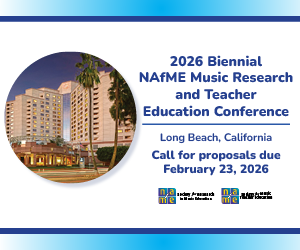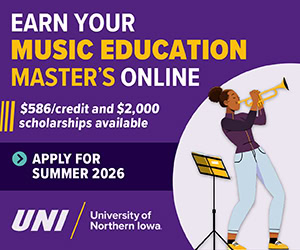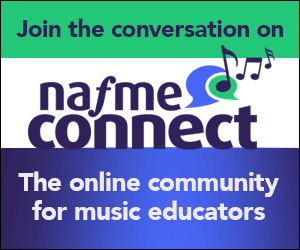
/ Membership / Meet Our Members / Matt Koperniak
What do you see as the major challenges music education will face during your term and in what ways can you transform these into opportunities during your presidency?
Music teacher shortages have been a persistent challenge throughout the Southern Division, and I anticipate this will continue over the next several years, particularly in elementary music and music technology. These shortages may occur against the backdrop of economic uncertainty in many communities. This combination is dangerous, as it is far easier for a school district to cut a vacant position when faced with a declining budget. I believe this is an opportunity to increase visibility and expand NAfME’s efforts with mentoring and teacher certification pathways, building upon the work of the Music Teacher Pipeline Initiative and Music Teacher Profession Advisory Committee.
Many school district budgets across the Southern Division are shrinking. This will lead to funding and access challenges, making this a critical time to increase our advocacy work to ensure music education is visible and valued in policy at the national, state, and local levels. As Southern Division President, I would prioritize advocacy in collaboration with our state leadership and serve as a resource to state MEAs and NAfME members working to advance music education with their elected officials.
Finally, I believe the impact of AI on the workforce will create a perceived need for more students to abandon creative fields in favor of technology pathways. It is crucial that we clearly demonstrate our unique ability as humans to engage in creative processes. Part of this work includes relevant utilization of AI in our work as music educators. However, a larger part is the continued relevance of music in the lives of all people as a core part of our humanity. I believe that NAfME is positioned to demonstrate the importance of human creativity on a national stage, while ensuring that members have AI professional learning opportunities specifically for music teachers.
What do you see as the major challenges the association will face during your term and in what ways can you transform these into opportunities during your presidency?
I have been a proud member of NAfME for 25 years, and I believe in the unique importance of having a national organization representing our profession. However, I recognize that some music teachers question NAfME’s relevance, particularly if they feel the only reason for joining is to enable their students to audition for All-State or participate in concert performance assessments through their state MEA. This question of relevance also affects teachers of general music, guitar, and music technology, who may not feel they have a tangible reason to join both their state MEA and NAfME.
In recent years, NAfME has made significant efforts to reframe the importance and interconnectedness of the state MEAs. I believe these efforts need to continue and expand so our members and potential members can easily understand the importance of having a national organization to represent our profession.
As Southern Division President, I would continue to support and promote NAfME activities that cannot be duplicated by the states. In particular, I view advocacy on the national level as NAfME’s superpower. I have seen the benefits firsthand of NAfME’s advocacy work, particularly the impact of Title IV-A funds used to support music education due to the specific inclusion of music as part of a “well-rounded education” in the Every Student Succeeds Act. National-level advocacy efforts directly benefit music education in all states in the Southern Division, and I would support advocacy as a NAfME budget priority.
Another major challenge for both NAfME and many state MEAs is reduced financial stability. In general, nonprofits are experiencing far more financial challenges today than ten years ago. As Southern Division President, I would take seriously my fiduciary duty as a member of the National Executive Board. It is critical that NAfME’s expenditures continue to align with our values, our Strategic Plan, and most importantly, our income. I would also collaborate closely with our states in the Southern Division to support their work ensuring balanced budgets and diversifying income streams to meet the needs of rising costs.
How do you plan to advance equity/DEIA in NAfME during your term of office?
Growing up, I was privileged to have a public school music education that provided me with numerous advantages as I moved forward into college and career. Recognizing that many music teachers and students have not had these same advantages, I prioritize listening and learning from the multitude of voices that have lacked the privileges I have had. As Southern Division President, I would ensure my leadership reflects the diverse needs of our members and states. This includes actively seeking out and amplifying voices and communities that lack access and representation. I believe it is crucial to create an inclusive environment where every member feels heard and valued.
To advance equity, diversity, inclusion, and access within NAfME, I would advocate for initiatives that promote equitable opportunities for all students and teachers. This would include professional development, policy advocacy to address systemic barriers, and fostering a culture of inclusivity within our organization.
I strongly believe that all students are musical and that every student should see themselves as belonging in music education. By embracing and celebrating the diverse backgrounds and experiences of our members, we can create a richer and more vibrant musical community. My goal is to ensure that music education is accessible to all, regardless of background or circumstances, and to inspire a sense of belonging and empowerment in every NAfME member.
Equity Statement
Music has the power to unite, inspire, and uplift all humans. I am committed to advancing equity throughout the National Association for Music Education and the field of music education. Equity is essential for shaping policies, programs, and opportunities that respect and elevate the diverse perspectives of all music educators and learners. If elected, I look forward to collaborating with our state MEAs to foster inclusive practices, amplify underrepresented voices, and address systemic barriers in music education. I believe that my actions as a leader reflect this commitment.
During my term as president of the Georgia Music Educators Association, we prioritized initiatives to expand access and representation. We launched the first HBCU reception at our annual conference, now in its fourth year, and established our first DEIA committee. This committee sparked increased dialogue and action among our Board to review policies and practices through the lens of equity. We also formed the first Exceptional Student Success committee, which led to more conference sessions and performance opportunities impacting students with disabilities. Additionally, we created a Music Teacher Task Force to examine the music teacher pipeline in Georgia, resulting in research on high school students entering the music education profession. This initiative also led to a rebranded and no-cost conference experience for high school students interested in a career in music education, ensuring participation regardless of socioeconomic background.
In my current role as a school district Performing Arts Coordinator, my commitment to equity is reflected in key initiatives including: (1) leveraging grant funds to launch a free summer camp for students in underserved communities to remediate and accelerate skills due to pandemic-related learning loss (now in its fifth year); (2) expanding music therapy services for students with disabilities in self-contained classrooms; and (3) partnering with external organizations to secure increased funding and programming for Title I schools.
I have been fortunate to collaborate with many music educators that have carried this work forward. The initiatives described above were the result of many dedicated music educators partnering together. As Southern Division President, I would seek similar partnerships and relationships within NAfME and the music education community to build upon our collective work to ensure access and representation within our organization and the music education profession.
Leadership Statement
Like many leaders, I began my journey as a first-year music teacher by volunteering to set up and tear down at events, moving chairs, music stands and equipment. Eventually, I started hosting and organizing district events, then state events. I firmly believe that our local MEA volunteers are the lifeblood of NAfME, our state MEAs, and our profession. As a state president, I looked for ways to support and elevate the work at the local level, ensuring these opportunities would continue for years to come.
Over the past several years, I have attended state MEA conferences in Alabama, Florida, Georgia, North Carolina, and Tennessee. If elected to serve as Southern Division President, I will continue to prioritize attending conferences and events of our state MEAs. There is no substitute for relationships developed in person. At these events, I will meet with state leaders and members, listen to their challenges and successes, and offer support and solutions.
As a past state president, I understand the challenges and demands on our state MEA leaders. When I was a state president, we faced serious financial challenges that threatened our long-term stability. We prioritized fiscal responsibility and transparency to ensure our association would survive and thrive into the future. As Southern Division President, I would collaborate with leaders to support the efforts of our state MEAs to work through financial challenges, while fulfilling my fiduciary duty as a member of the National Executive Board to ensure that NAfME is a good steward of membership dues while exploring and expanding future income possibilities.
In supporting our members and states, I bring my experience teaching music at all levels in public schools, along with my experience as a district arts coordinator, leading 180 music teachers and music therapists across 100 schools. A career in music education can be stressful, time-consuming, and frustrating, but it can also be joyful, rewarding, and fulfilling. After twenty-one years, I still believe it is the best profession in the world.
As an introverted person, I am slow to speak at first, taking time to listen and formulate my thoughts. I love to listen, learn, and make new connections in our music education profession. Finally, I believe strongly in the principles of servant leadership. This goes beyond simply moving chairs and music stands at our events. A servant leader serves not only the members, but the mission and values of the organization. As Southern Division President, I would strive to exemplify this level of service to NAfME and our state organizations


